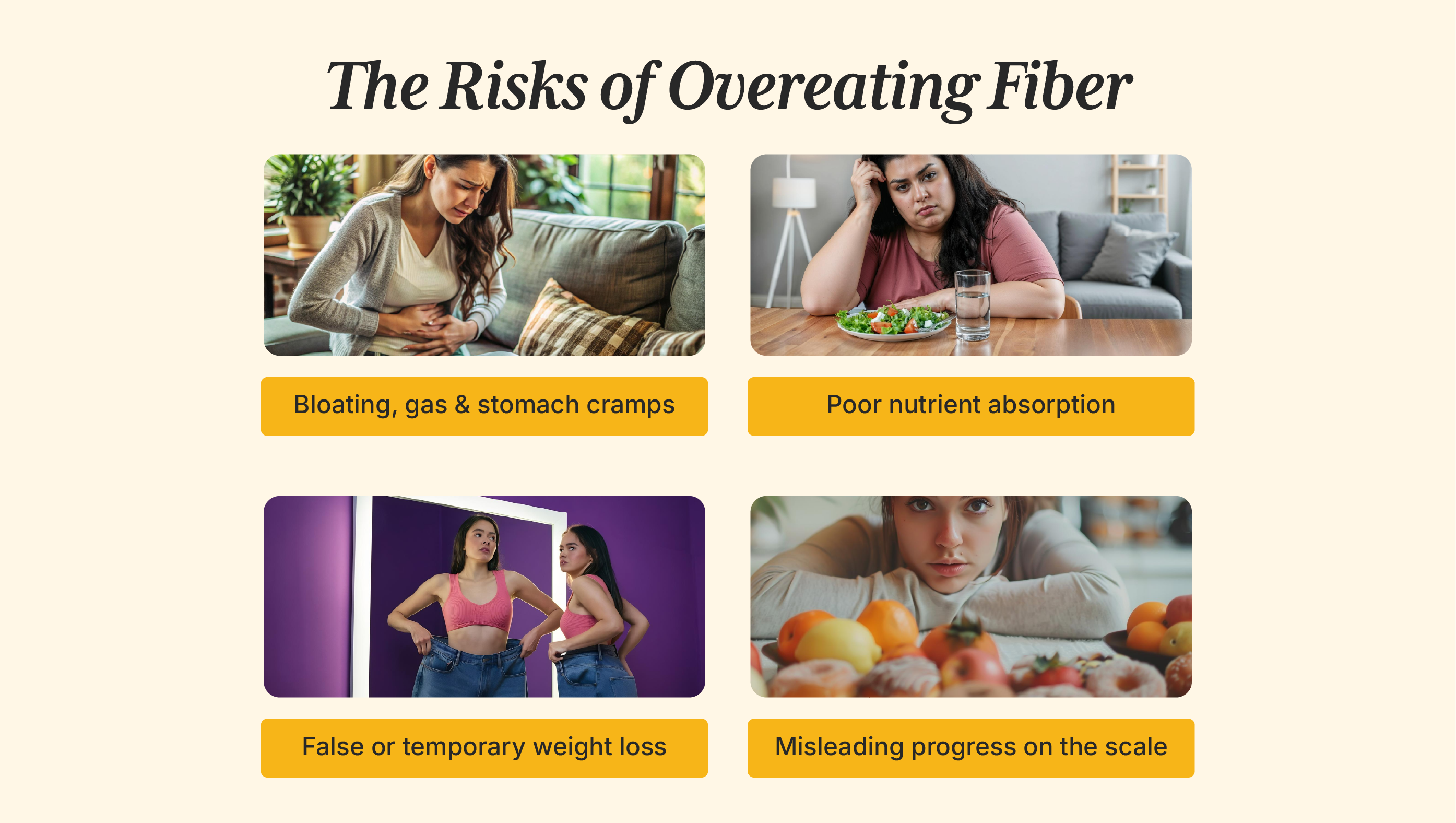Introduction
A new trend has entered the health and fitness world, “fibermaxxing.” If you’ve been scrolling through wellness reels or fitness forums, you’ve probably seen people talking about it. The idea is simple: eat a lot of fiber so you feel full, automatically eat fewer calories, and eventually lose weight.
At first glance, it makes sense. Fiber is known to help in digestion, support gut health, and keep hunger away for longer. But now it has become a new buzzword among those who are desperate to lose weight quickly. In India, where lifestyle diseases and obesity are on the rise, this trend seems to have caught on faster than ever. People are adding extra servings of oats, seeds, husk, and vegetables, believing it’s the new secret to getting slim.
But here’s the big question: Is this really a healthy and sustainable way to lose weight, or is it just another diet fad that might backfire in the long run? Let’s look deeper from iThrive's lens
Why People Are Moving Towards Fibermaxxing
Fiber Keeps You Full for Longer
Fiber slows down digestion. This helps you stay full for a longer time. For people trying to cut calories, this seems like a win because it allows them to eat less, stay satisfied, and still aim for weight loss.
Good for Digestion and Gut Health
Fiber supports healthy digestion and helps regulate bowel movements. Many people also see it as a simple way to improve gut health and reduce problems like bloating or constipation while working on their weight.
Low-Calorie, High-Volume Food
Foods rich in fiber are generally low in calories but high in volume. This means you can eat a larger portion without consuming too many calories, which makes it easier to manage weight.
Rising Obesity and Lifestyle Diseases in India
Obesity, diabetes, and other lifestyle-related diseases are increasing in India due to sedentary work, poor diets, and stress. People are searching for quick and affordable ways to manage their weight, and fibermaxxing appears to offer a simple solution.
The Appeal of Shortcuts
Building healthy habits takes time and consistency, but many people prefer fast results. Fibermaxxing feels like an easy shortcut because it requires only one change that is just adding more fiber instead of making several lifestyle adjustments.
Social Media and Influencer Hype
Social media is full of influencers promoting fiber-heavy meals, smoothies, and detox drinks as quick fixes for weight loss. These trends spread quickly, making fibermaxxing look like the latest magic formula for getting slim.
Truth or Myth? Can Fiber Alone Help You Lose Weight?

Fiber does play an important role in weight management. Since it slows down digestion, it helps you stay fuller for longer, reduces sudden hunger pangs, and lowers the urge to snack in between meals and reduces sugar spikes. Naturally, this may reduce your overall calorie intake, which can sometimes result in short-term weight loss. That’s why fibermaxxing appears to “work” for some people initially; they feel satisfied with less food and see the numbers on the scale go down.
But just because something works in the short run doesn’t mean it’s the right or sustainable way to lose weight.
One of the biggest problems with diet trends like fibermaxxing is the assumption that what works for one person will automatically work for everyone else. But the truth is that every body is unique, and weight gain happens for different reasons in different people. This is why some may see results with fibermaxxing, while others may feel worse or see no change at all.
Here are some examples:
Hormonal Imbalances (PCOS, Thyroid, Insulin Resistance)
For people with hormonal conditions like PCOS, thyroid dysfunction, or insulin resistance, weight gain is deeply tied to how their body processes hormones. Fiber cannot “fix” these imbalances. Unless hormones are regulated and supported through the right nutrition, supplementation, and lifestyle, simply adding more fiber will not bring healthy or lasting weight loss.
Stress, Poor Sleep and Sedentary Lifestyle
Stress is a silent driver of weight gain. High stress elevates cortisol levels, which encourages fat storage, especially around the belly. Poor sleep further disrupts hunger, satiety hormones, and circadian rhythm, making you crave more food. In such cases, no amount of fiber will stop the body from holding on to excess fat. Managing stress and improving sleep quality are just as important as diet.
Chronic Gut Issues
People with weak or inflamed guts, those dealing with IBS, IBD, or frequent bloating, may actually feel worse with too much fiber. While fiber is often praised for gut health, in sensitive cases it can trigger more gas, cramps, altered or infrequent bowel movements, and discomfort. Without addressing underlying gut imbalances, fibermaxxing can backfire.
So while fiber may help manage appetite, it cannot fix these deeper issues. Without addressing the root causes, weight loss from fibermaxxing is likely to be temporary and incomplete. If you are dealing with weight gain issues, first find out the real reason behind it through a root cause analysis. This will help you understand what’s wrong with your body and which aspects need attention.
The Risks of Overeating Fiber
Fibermaxxing might look harmless, but eating excessive amounts of fiber can create new problems:
Bloating, Gas, and Stomach Cramps: High fiber intake can overload the digestive system, especially if your gut isn’t functioning properly. Instead of feeling light and energetic, many people end up with heaviness, discomfort, and even pain.
Poor Nutrient Absorption: Fiber binds to certain minerals like iron, zinc, and calcium. When consumed in very high amounts, it can reduce the absorption of these nutrients, leading to deficiencies in the long run. This is especially concerning in India, where iron and Vitamin D deficiencies are already common.
Temporary or False Weight Loss: The weight you lose through fibermaxxing is often due to reduced calorie intake or water weight, not actual fat loss. This means the results are not sustainable, the moment you stop the high-fiber regime, the weight often comes back.
A False Sense of Progress: Because the scale shows lower numbers, people think they are becoming healthier. But if the root causes of their weight gain like hormonal imbalance, stress, or poor gut health, remain unaddressed, then the so-called “progress” is misleading.

Root Cause Approach to Healthy Weight Loss
While fibermaxxing may create a short-term drop on the weighing scale, it doesn’t address why the body gained weight in the first place. Real and sustainable fat loss comes from identifying and fixing the root causes that block the body’s natural ability to stay healthy.
Here are the key areas to focus on:
Balancing Hormones
Hormones act like “managers” of your metabolism. When they are out of balance, losing weight becomes extremely difficult, no matter how much fiber you eat. Conditions like PCOS, thyroid dysfunction, or insulin resistance require a targeted approach that supports hormonal health through proper nutrition, supplementation, and lifestyle shifts. Once hormones are in balance, weight loss starts to happen naturally. Book a free consultation now to understand what’s wrong with your body and get the real reason behind your weight gain issues.
Healing the Gut and Reducing Inflammation
A healthy gut is central to overall well-being and weight regulation. Chronic inflammation or imbalances in gut bacteria can cause bloating and slow metabolism. Healing the gut with the right foods, probiotics, and lifestyle practices is far more effective than simply piling on fiber, especially if your digestive system is already sensitive.
Correcting Nutrient Deficiencies
Many people struggle with deficiencies in essential nutrients like Vitamin D, magnesium, B12, and zinc. These nutrients are critical for energy production, reducing inflammation, metabolism, and fat-burning pathways. Without correcting these deficiencies, the body cannot function optimally, and weight loss efforts often stall. This is why lab testing and supplementation are so important for a truly effective plan.
Lifestyle Improvements (Stress, Sleep, and Activity)
Weight is not just about what you eat, it’s also about how you live. Chronic stress keeps cortisol levels high, which promotes fat storage. Poor sleep disrupts hunger hormones, making you crave more food. And a sedentary lifestyle reduces calorie burn and slows metabolism. Addressing these lifestyle factors through stress management, better sleep hygiene, and regular physical activity makes weight loss smoother and more sustainable.
When these root causes are addressed, the body starts to function the way it was designed to. Weight loss becomes a natural outcome of healing, not a forced result of extreme diets or food hacks. Unlike fibermaxxing, this approach doesn’t just shrink the number on the scale; it builds long-term health, energy, and vitality.
Conclusion
Real, sustainable weight loss isn’t about chasing the next food hack or relying on a single nutrient. It’s about healing from the inside, fixing the imbalances in your hormones, nurturing your gut, correcting deficiencies, and supporting your body through better lifestyle choices.
When you work on the root causes, weight loss is no longer a constant struggle, it becomes a natural byproduct of improved health. Instead of fighting against your body with restrictive or trendy diets, you start working with your body to restore balance.
That’s exactly what we focus on at the iThrive. Instead of giving you one-size-fits-all shortcuts, our experts dig deep into your body’s unique needs, uncover the hidden root causes of weight gain, and create a personalized healing plan. Book a free consultation today.
Subscribe to our newsletter and receive a selection of cool articles every week





.png)


.webp)

.jpg)
.jpg)










